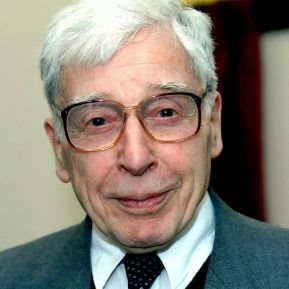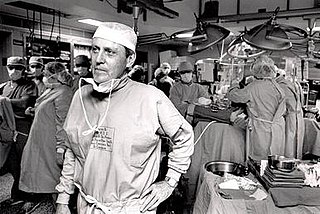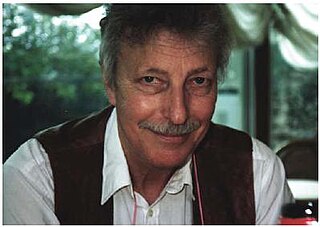James Edward Rothman is an American biochemist. He is the Fergus F. Wallace Professor of Biomedical Sciences at Yale University, the Chairman of the Department of Cell Biology at Yale School of Medicine, and the Director of the Nanobiology Institute at the Yale West Campus. Rothman also concurrently serves as adjunct professor of physiology and cellular biophysics at Columbia University and a research professor at the UCL Queen Square Institute of Neurology, University College London. Rothman was awarded the 2013 Nobel Prize in Physiology or Medicine, for his work on vesicle trafficking. He received many other honors including the King Faisal International Prize in 1996, the Louisa Gross Horwitz Prize from Columbia University and the Albert Lasker Award for Basic Medical Research both in 2002.

Sir Robert Geoffrey Edwards was an English physiologist and pioneer in reproductive medicine, and in-vitro fertilisation (IVF) in particular. Along with the surgeon Patrick Steptoe, and the nurse Jean Purdy, Edwards successfully pioneered conception through IVF, which led to the birth of Louise Brown on 25 July 1978. They founded the first IVF programme for infertile patients and trained other scientists in their techniques. Edwards was the founding editor-in-chief of Human Reproduction in 1986. In 2010, he was awarded the Nobel Prize in Physiology or Medicine "for the development of in vitro fertilization".

Thomas Earl Starzl was an American physician, researcher, and expert on organ transplants. He performed the first human liver transplants, and has often been referred to as "the father of modern transplantation."
The American Society for Reproductive Medicine (ASRM) is a multidisciplinary organization dedicated to the advancement of the science and practice of reproductive medicine. It provides a forum for lay public, researchers, physicians and affiliated health workers through education, publications, and meetings. The Society has its headquarters in Birmingham, AL and a public affairs office in Washington, DC.

Sir John Macleod Ball is Sedleian Professor of Natural Philosophy at the University of Oxford. He was the President of the International Mathematical Union from 2003–06 and a Fellow of Queen's College, Oxford. He was educated at the University of Cambridge and Sussex University, and prior to taking up his Oxford post was a professor of mathematics at Heriot-Watt University in Edinburgh.
Bert W. O’Malley is the Tom Thompson Distinguished Service Professor of Molecular and Cellular Biology at Baylor College of Medicine. A native of Pittsburgh, he has a bachelor's degree from the University of Pittsburgh and a M.D. from their School of Medicine (1963). He completed his residency at Duke University and spent four years at the National Institute of Health followed by four years serving as the Luscious Birch Professor and the director of the Reproductive Biology Center at Vanderbilt University. He then moved to Baylor as Professor and Chairman of Molecular and Cellular Biology.
Ronald Levy is an American medical doctor and scientist at Stanford University. He specializes in lymphoma, including non-Hodgkin lymphoma, Burkitt's lymphoma and Hodgkin's disease. His research investigates how the immune system can be harnessed to fight lymphoma. His work has led to the concept that antibodies can be used as personalized anticancer drugs and to the development of an antibody-based drug, Rituxan, that is widely used to treat lymphoma.

Sir Melvyn Francis Greaves FMedSci, FRS is a British cancer biologist, and Professor of Cell Biology at the Institute of Cancer Research (ICR) in London. He is noted for his research into childhood leukaemia and the roles of evolution in cancer, including important discoveries in the genetics and molecular biology underpinning leukaemia.

James Patrick Allison is an American immunologist and Nobel laureate who holds the position of professor and chair of immunology and executive director of immunotherapy platform at the MD Anderson Cancer Center at the University of Texas.
André Capron is a French immunologist and parasitologist known for his work on schistosomiasis (bilharzia).
Albert Ernst Renold was a Swiss physician. In 1986 he was awarded the King Faisal International Prize in Medicine together with Lelio Orci and Gian Franco Bottazzo for contributions to the understanding of Diabetes Mellitus.
Gian Franco Bottazzo was an Italian physician. In 1986 he was awarded the King Faisal International Prize in Medicine together with Lelio Orci and Albert Renold for contributions to the understanding of Diabetes Mellitus.
Robert Williamson is a retired British-Australian molecular biologist who specialised in chromosone research.
Tetsurō Fujiwara is a Japanese physician. In 1996 he was awarded the King Faisal International Prize in Medicine together with Bengt Robertson for contributions to the understanding of neonatal medicine.

Bengt A. Robertson was a Swedish physician. In 1996 he was awarded the King Faisal International Prize in Medicine together with Tetsurō Fujiwara for contributions to the understanding of neonatal medicine.
James Francis Gusella is a Canadian molecular biologist and geneticist, also known as "Lucky Jim". He is professor of neurogenetics and director of the Center for Neurofibromatosis and Allied Disorders at Harvard Medical School, and director of the Center for Human Genetic Research at Massachusetts General Hospital.
Michael Field was an American gastroenterologist celebrated for his work on diarrhea.
Johanne Martel-Pelletier is a Canadian pharmacologist living and working in Quebec. She studies the pathophysiology and molecular mechanisms of arthritis.
Donald Dean Trunkey is an American trauma surgeon.
Celso-Ramón García was an American physician who specialized in reproductive endocrinology and infertility. He oversaw early clinical trials of the first oral contraceptive pill in Puerto Rican women and later became a professor of human reproduction at the University of Pennsylvania.









